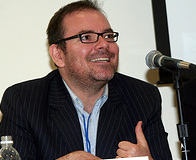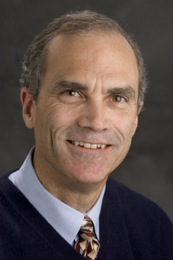
The time-worn debate of Bloggers vs. Journalists has finally run its course. For years, traditional journalists scoffed at bloggers as pajama-wearing screamers, while bloggers have pointed to MSM (mainstream media) as secretly biased and obsolete. While the extremists in this argument have had the stage shouting at each other loudly (and it continues to this day), what has happened quietly in the background has received less attention: Mainstream media reporters have started blogging in droves, while larger blog operations have hired seasoned reporters and focused on doing traditional journalism.
How indistinguishable are large independent blogs and traditional media sites? Take the following quiz:
1. Who won a recent Polk Award for investigative journalism, a blogger or MSM reporter?
2. Which big New York-based website has four editors and four reporters, and is looking to hire two more reporters — a blog or traditional media outlet?
3. Which site hired a young blogger fresh out of college? Blog or MSM site?
4. Which site in Silicon Valley edits 80% of stories before being published online? Blog or MSM site?
Answers: 1. Josh Marshall, Talkingpointsmemo blogger; 2. Gawker blog; 3. NYTimes.com, hiring TVNewser’s Brian Stelter; 4. GigaOm blog.
The largest mainstream news sites, such as Washingtonpost.com and MSNBC.com, are brimming with blogs, usually run by reporters, editors and producers who now write more frequently and with a more personal style than in a typical news report. Simultaneously, independent blogs are doing more reporting, breaking more news and hiring former journalists to staff their publications. While the New York Times was hiring Brian Stelter and distributing the Freakonomics blog, the tabloid blog network Gawker Media was hiring seasoned journalists like Owen Thomas for Valleywag and changing its mastheads to include “managing editors,” “associate editors,” “reporters” and even an “editor at large” (on Defamer).
Anyone who still believes that bloggers are one breed and journalists are another has been living in a cave since roughly 2002.
“I think the argument about bloggers vs. journalists has been over for years,” said Jim Brady, executive editor of Washingtonpost.com. “We’ve all co-existed just fine for a while now, and the truth is, the distinction is less relevant every day. There are thousands of journalists who now blog, and there are lots of bloggers who are trained journalists.”
Blogger/journalist Josh Marshall at Talkingpointsmemo won a Polk Award for investigative journalism, helping piece together the U.S. attorney-firing scandal, which led to Attorney General Alberto Gonzales resigning. Not only was it a first for a blogger to win this award, but it showed that a new type of hybrid online journalism — combining original reporting, aggregation and audience involvement — could produce top-notch investigative work.
“Josh Marshall winning a Polk Award is a sign that the distinctions are becoming less relevant,” Brady said. “I don’t think readers care whether what they’re reading is in a blog or not. What they care about is whether they trust the source of that information, whether it’s a mainstream site or a pure blog.”
Bringing a Journalistic Ethos to Blogs
While some large news organizations were initially slow to launch blogs, they are now making up for lost time in the sheer number of offerings. Take the New York Times, which now has 53 different blogs, ranging from one by former TV host Dick Cavett to the groundbreaking forum-turned-blog for Times op-ed columnist Nicholas Kristof.
But you can’t define the type of journalism done on the Times’ blogs in one monolithic way. There are original reports, links and commentary, video and Q&As between bloggers and their audience. Plus, some blogs are written by full-time reporters while others are done by full-time bloggers — with Brian Stelter landing in between, spending half his time doing print reports and half blog posts. Stelter told me the biggest difference between blogging at the Times and at TVNewser is having an editor look at his copy before it’s posted.
“Every post is edited before it goes online,” Stelter said. “I certainly think that’s the way it should be. In the beginning, it was hard to be edited. But [now] I don’t know how I could blog without it. There are certain benefits to having another set of eyes on a story. Also, the tenor of what I’m doing has changed. I don’t do rumors or conjecture or speculation and I don’t do opinion…When Mike Wallace announced his retirement with ’60 Minutes,’ I wrote about it on TVNewser as an unconfirmed fact. And then Mike Wallace called up the New York Times to confirm it. So the New York Times got that credit. The downside of being at the New York Times is that I can’t report the rumor, but I can confirm it.”
Increasingly, large, independent blogs are also editing blog posts before they’re published online. GigaOm blog founder and executive editor Om Malik, who has extensive experience as a traditional media reporter, told me his editorial staff pre-edits about 80% of posts and often edits the others after they have been posted. Malik also prefers to hire bloggers who have a background in traditional reporting.
“If someone has a journalistic background, you don’t have to teach them the ethics of the game or what ‘off the record’ means,” he said. “And what is a rumor and what isn’t. I don’t hold it against anybody, that’s the way it is.”

So how can mainstream media blogs differentiate themselves in the blogosphere? For some time, traditional media outlets counted on the trust of their brand name, which helped them sell advertising and get loyal readers. Now, the playing field is more level, and readers find they can trust knowledgeable independent bloggers as much as reporters at major media sites. John Robinson, editor of the Greensboro (N.C.) News & Record, thinks readers can make up their own minds on the issue of trust. His site has had blogs since 2004, a relatively early date for a newspaper site.
“[Readers] understand bias and objectivity,” Robinson said. “They understand fairness and blather. Consequently, I think these readers understand the value of brand. They approach all brands with a degree of skepticism, but they inherently understand the difference between a newspaper that has been around for 150 years and a blogger who has been here for five. That doesnât mean that the blogger has less credibility than the newspaper, but that the reader looks for different things in different places and judges them on the value they bring to the table…Reasonable readers can evaluate it all for themselves.”
Robinson says that his newspaper blogs have their own niche by reporting, aggregating information, and expressing a “subtle attitude…but they don’t take the position of editorialist.” Robinson ticked off a list of ways that his blog has made him a better, smarter journalist:
> Because I get almost immediate feedback to what I write, I tend to be more precise in my wording and more sensitive to the impact of my words.
> Hearing from commenters and reading blogs, our coverage is shaped to some extent by what people are talking about and stories they suggest.
> I’m less insular. Reading so many different opinions about what we journalists are about makes me realize the importance of transparency and accessibility and misimpressions.
Not only do blogs play a role in changing the way traditional journalists do their job, they are also becoming a bigger part of the traditional media’s business. Robinson said that News & Record blogs account for 7.2% of the page views on his site, while Washingtonpost.com’s Brady said his site’s blogs rack up nearly 5% of the site’s traffic. While those numbers might appear small, they are large when you consider that blogs didn’t exist on these sites just a few years ago.
David Sarno, an Internet culture reporter and blogger for the Los Angeles Times, told me that the distinction between old and new media is fading away, as digital bits are becoming a part of every newsroom’s bloodstream.

“Every journalist should know how to blog,” Sarno said. “The Internet, clogged as it is with digital detritus, is still far and away the world’s best source of information. And being a good blogger means you can sift through it. That’s another great thing about the blogopshere — if you can succesfully tune in to the conversation other people are already having, you can benefit from the work that’s already been done. Plus, stories develop so quickly now that if you’re going to get a word in edgewise, you’ve got to figure out what hasn’t been said yet.”
Sticking to a Blogging Ethos
As mainstream media sites launch dozens of new blogs, independent blogs have been hiring folks with traditional reporting experience. Two recent examples are former Business 2.0 editor at large Erick Schonfeld going to work for TechCrunch while former Forbes reporter Peter Kafka went to Silicon Alley Insider. In both cases, the journalists had to adjust to a dizzyingly fast blogging schedule that requires multiple posts per day — and very few interviews.
Schonfeld told me he used to do 30 to 50 interviews for features he wrote for Business 2.0 (he also wrote the Next Net blog there), but now he’s lucky to do one interview as he posts multiple times per day to TechCrunch.
“I’ve adopted more of the blogging ethos than trying to impose a journalistic ethos on TechCrunch,” Schonfeld told me. “If you read the posts and see the typos, [you know] we don’t even have a copy editor…It’s a debate that we have here. I could spend more time and polish things and edit them, but the problem is that you then lose the individual voices. That personality is an important part of blogs. The rules are still being written about what’s allowed and what’s not. At the end of the day, you’re either a trusted source or you’re not a trusted source.”

Schonfeld describes the blog ethos as being: “We’re gonna put the headline up now and if it’s wrong in an hour, we’ll put up a new post in an hour…You post now and ask questions later.” But that attitude has brought trouble for Schonfeld, when he ran with a blog post about social networking site Bebo being acquired in early February — something that still hasn’t happened.
[UPDATE: AOL finally did acquire Bebo in mid-March.]
At Silicon Alley Insider (SAI), former Forbes reporter Peter Kafka has enjoyed the increased impact he can have at an independent blog. Even though Forbes.com sees a huge amount of traffic, he never had the opportunity to do a new kind of “incremental journalism” — similar to what Talkingpointsmemo does — giving one part of a story and building on it with original reporting and aggregation over time.
“What you don’t do here [at SAI] is spend weeks on a story before you publish something,” Kafka said. “What you can do, which is liberating, is you can say, ‘I know one thing about this story.’ And then you can add things to it over time in increments. You can add to it piece by piece, and I prefer it in many ways because you don’t have this long, groaning setup and weighty conclusion. You can just say, ‘This is what we know today, and when we know more we’ll write more.’”

While Gawker blogs are known more for snark and sarcasm than for reporting news and interviewing people, they have broken news by knowing the right people and being read by people inside of media and tech companies. And last year, Gawker writer Maggie Schnayerson helped cover the plight of Viacom “permalancers,” who staged a protest and gained concessions from the media behemoth. Gawker served as a place for news about the protest, and Viacom workers talked about how their benefits were being cut in Gawker comments. Ironically, Schnayerson was fired from Gawker for not generating enough page views for her blog posts.
BusinessWeek media columnist and blogger Jon Fine, who has been the target of Gawker’s poison pen, grudgingly admitted the blog has been doing more service journalism lately.
“[Gawker is] an enormous pain in my ass on a personal level, but they epitomize the fluid definition of [blogging and journalism],” Fine told me. “They have their personal attacks, which are fine, and then they will break news occasionally. They did all that scientology stuff [with the Tom Cruise video], and there was service to that, it was legimate…We’re not going to mistake Gawker for the New York Times anytime soon. Gawker isn’t hiring people who worked at the New York Times for 15 years, they’re still hiring young people and making them work endless hours.”
As Gawker looks to hire two more reporters for its flagship blog, the amount of pre-editing done on the blog is actually going down. Last year, the blog’s editor Choire Sicha checked each post before it was published, but that practice changed after he left. Gawker reporter Nick Douglas (formerly of Valleywag) said that having less editing is a hallmark of blogging.

“Yes, blogging might mean that a story goes through less editing,” he said. “Or at least it should, as what’s the point of using a faster system for breaking news and short-form commentary if you’re going to run it all through the same slow machine? Teach the writer to edit, dammit, or have someone on call [to edit].”
Though established blogs are gaining more credibility with readers, they still have had trouble getting press credentials for events. Robert Cox, president of the Media Bloggers Association (MBA), helps defend the First Amendment rights of blogger. In an email to me, Cox said that the bloggers vs. journalists debate is far from over for bloggers such as Erin Kotecki Vest and John Spinelli:
Erin’s case is particularly telling. She was planning on covering the GOP debate in California. At the last minute she was told that only media credentialed by the L.A. Police Deptartment could get a credential for the debate. She had previously had such a credential. When she went to the LAPD she was told it would take WEEKS for her to be considered (and even then they were not too encouraging about her getting one as a blogger). She did not get a credential for the debate.
John Spinelli was a reporter at the Ohio statehouse but now that he is online he is getting the cold shoulder. In his case the credentialing is determined by a cadre of traditional media types. No surprise then that they have been less than welcoming.
On the flipside, the MBA has successfully credentialed bloggers for the Scooter Libby trial and the PBS presidential debates, while helping set up a political group blog for Newsweek.com called The Ruckus, which aggregates various political blogs. That kind of crossover project showcases just how blurry the lines have become between mainstream media and independent blogs.
What do you think? How do you see the media ecosystem evolving with blogs proliferating at mainstream news sites and independent blogs hiring experienced reporters? Will they continue down this path and how differentiated will they remain? Share your thoughts in the comments below.
UPDATE: While it was impossible to include all journalist/bloggers in this story, I admit that it would have been nice to include some lesser known sources — and yes, some women. Here’s one comment from Tracy Record at the West Seattle Blog:

Gee whiz, with six photos including SpongeBob, couldn’t you have found at least one FEMALE journablogger/blogalist to depict photographically? We XX-chromosomed types are out here in pretty big numbers too. (I’m an independent journalist, just left 20-plus years in MSM, operating a hyperlocal news site in blog format.)
Better late than never, here’s a pic of Tracy taken outside of Seattle City Hall. Also, I neglected to talk about my own situation as a journablogger, and have corrected that with a more personal post here.
Photo of Josh Marshall by JD Lasica via Flickr. Photo of Nick Douglas by Scott Beale.

Was this article edited?
Yes, this post was edited by a PBS producer before it was published. All “Digging Deeper” posts on MediaShift are edited before being posted, which I think improves the quality of the stories.
There was never a distinction. If bloggers were doing journalism then they were journalists. The publishing platform does not define who you are…
I dont think of the big blog sites as blogs, theyre more like micro-publishers. Theyre businesses. They worry about page-views, their brands and they sell sponsorships/ advertising on their sites at very high CPMs. For my vantage point, this all makes sense. Why should the media industry evolve any differently than other industries where weve seen this phenomenon of micro-brands before (Music, Beer, Consumer Package Goods, Grocery Stores, Fashion just to name a few)?
I dont think of the big blog sites as blogs, theyre more like micro-publishers. Theyre businesses. They worry about page-views, their brands and they sell sponsorships/ advertising on their sites at very high CPMs. From our vantage point, this all makes sense. Why should the media industry evolve any differently than other industries where weve seen this phenomenon before (Music, Consumer Package Goods, Grocery Stores just to name a few)?
Its unfortunate, Mr. Glaser, that we didnt have a chance to speak before you posted this story. At the time I received an email from Mr. Cox of the Media Bloggers Association that you might contact me to comment on it, I was covering the Democratic Presidential Debate in Cleveland between Sens. Clinton and Obama for ePluribus Medias OhioNews Bureau.
The assignment gave me a chance to stand shoulder to shoulder with reporters, great and small, as I did repeatedly during my three years as practicing journalist credentialed as an Ohio Statehouse correspondent. Cleveland State University (CSU), the host and credentialing authority for this historic event, was egalitarian in its issuance of media credentials to many of us who have migrated to online news and information Websites.
Unlike the pious, discriminatory and subjective reasons given me by my former colleagues in denying me membership in a group I was a member in good standing of before leaving their ranks and going digital, CSU was egalitarian in admitting me and other respected Ohio bloggers (I prefer the term new-media journalist since thats what I am) to a news event of historic proportions. It appears that the governing members of the Ohio Statehouse press corps still seem to be living in that cave of denial between bloggers and journalists to which you alluded.
One behalf of the small, dedicated team of online collaborators I work with who work as hard any team of journalists and editors at any newspaper to source, fact-check and produce a news product that reflects professional standards of journalism, we want to thank you for bringing our long, pioneering but unsuccessful saga to be the first virtual news and information service to gain Statehouse credentials, and the access to Senate and House floor sessions that go along with them, to your reading audience. The link you provided to our story is greatly appreciated.
Although we have taken a respite from our adventure to break into this media monastery that seems more focused on protecting the vested news print interests it has represented since its formation in 1893, were hopeful that with a little help from some friends we will start to write a new chapter about the changing face of journalism in covering Ohio government and the elected leaders and their appointees who run it. Moreover, who is and is not a journalist worthy of covering the publics business from the inside is a question we have an answer to.
With a renewed effort to breach the barriers thrown against us, we hope to shrink the difference between new-media journalists and legacy print journalists to the size that, borrowing a phrase from that renowned tax-cutting advocate Grover Norquist, can be drowned in the bathtub. Stay tuned.
Its unfortunate, Mr. Glaser, that we didnt have a chance to speak before you posted this story. At the time I received an email from Mr. Cox of the Media Bloggers Association that you might contact me to comment on it, I was covering the Democratic Presidential Debate in Cleveland between Sens. Clinton and Obama for ePluribus Medias OhioNews Bureau.
The assignment gave me a chance to stand shoulder to shoulder with reporters, great and small, as I did repeatedly during my three years as practicing journalist credentialed as an Ohio Statehouse correspondent. Cleveland State University (CSU), the host and credentialing authority for this historic event, was egalitarian in its issuance of media credentials to many of us who have migrated to online news and information Websites. Unlike the pious, discriminatory and subjective reasons given me by my former colleagues in denying me membership in a group I was a member in good standing of before going digital, CSU was egalitarian in admitting me and other respected Ohio bloggers (I prefer the term new-media journalist since thats what I am) to a news event of historic proportions. It appears that the governing members of the Ohio Statehouse press corps still seem to be living in that cave of denial between bloggers and journalists to which you alluded.
One behalf of the small, dedicated team of online collaborators I work with who work as hard any team of journalists and editors at any newspaper to source, fact-check and produce a news product that reflects professional standards of journalism, we want to thank you for bringing our long, pioneering but unsuccessful saga to be the first virtual news and information service to gain Statehouse credentials, and the access to Senate and House floor sessions that go along with them, to your reading audience. The link you provided to our story is greatly appreciated.
Although we have taken a respite from our adventure to break into this media monastery that seems more focused on protecting the vested news print interests it has represented since its formation in 1893, were hopeful that with a little help from some friends we will start to write a new chapter about the changing face of journalism in covering Ohio government and the elected leaders and their appointees who run it. Moreover, who is and is not a journalist worthy of covering the publics business from the inside is a question we have an answer to.
With a renewed effort to breach the barriers thrown against us, we hope to shrink the difference between new-media journalists and legacy print journalists to the size that, borrowing a phrase from that renowned tax-cutting advocate Grover Norquist, can be drowned in the bathtub. Stay tuned.
Hi Mark,
Today’s post was very interesting and timely. I’m sorry we didn’t get a chance to chat earlier about Spot-on’s work over the past three years.
Back in April, 2005, I coined the phrase “stand alone journalism” to describe the future of the media business. Reading your column I guess I was er….spot-on.
If you like to see it, it’s here: http://journalism.nyu.edu/pubzone/weblogs/pressthink/2005/04/21/nol_stnd.html
Of course, you’re aware that there are 14 contributors to Spot-on.com right now. Of that number, 12 are experienced newsroom professionals, including Christopher Allbritton (http://www.spot-on.com/allbritton), a former Time magazine stringer in Iraq, and Marisa Trevino (http://www.spot-on.com/mtrevino), a well-known writer and commentator from Dallas. All of our posts are edited. Every once in a while I rewrite a headline.
Spot-on’s mission has never been to displace what others have dismissed as “mainstream media”. Since the day this site started we have aimed to help editors and publishers supplement what they’re doing with new, interesting and compelling voices. Spot-on’s CEO Doug Page – formerly head of sales for Tribune Media, the nation’s largest syndication service – is pushing that project forward – you’ll see some announcements from us soon.
Spot-on’s already done a few distribution deals to prove out our model, most notably with the WashingtonPost. The press release for that is here: http://findarticles.com/p/articles/mi_m0EIN/is_2007_May_21/ai_n19155613 This is similar – and predates – PaidContent’s deal with the NYTimes.
Lastly, we took down our 1st round of funding in the summer of 2005, ahead of Om Malik’s GigaOm. We’re out now looking another round to expand our reach and develop a new and innovative service that we think will add a new dimension to how editorial is sold on the web. Again, I hope to have announcements about this soon.
And lastly, while I don’t want to belabor this, is it a coincidence that the only people you talked for with this story were men? There are lots and lots of women working on the web today, Mark. It seems odd – and frustrating, honestly – to see continue to see such a narrow perspective of this vibrant medium.
What I hope will happen as the blog industry matures is that we’ll also have more editing features available to us. The emphasis on speed sometimes leads to stories being sloppily written or poorly constructed, and with no editor, those stories get posted that way. Give bloggers more of a sounding board before they post, and I believe the differences between bloggers and journalists will narrow even further. I’m not sure if the answer is more software, or live editors, or some sort of group of beta readers, but I think something will develop.
Thanks for declaring this. But the dim, bitter sportsters will still try to denigrate blogs, even as they’re beaten badly (see Chicago Tribune/Mark Prior injury, 2006). And unprofessional, biased reporters will still feel superior, even as they violate every “rule” in the “book” about being objective.
Thanks for declaring this. But the dim, bitter sportsters will still try to denigrate blogs, even as they’re beaten badly (see Chicago Tribune/Mark Prior injury, 2006). And unprofessional, biased reporters will still feel superior, even as they violate every “rule” in the “book” about being objective.
Good blog or article Mark. The distinction is blurring and as you point out some bloggers are doing reporting in a new template and with more velocity. At the end of the day or article, it’s about who you trust…
Mark…as a blogger who’s known you for awhile, I’m *very* disappointed in this piece.
You’ve got it wrong about the blurring, but many of your commenters have it quite right: just because a journalist is using a newfangled CMS and has to think differently about how he’s writing (as in not doing as many interviews) doesn’t make him a blogger. That person, including Josh Marshall, is *still* and always will be first and foremost a journalist…no matter what CMS is used…
The confusion, and the blurring, is going on in the minds of the journalism community–but there’s little blurring outside of that community.
If you want to write about bloggers, why don’t you talk to those of us who, with no previous journalism credentials or backgrounds, have made something of ourselves in this space? Sure, we may not be winning Polk Awards, and may not have thousands of readers and lucrative BlogAds or Federated Media income, but we have innovated and created and are working very, very hard to have strong, credible voices–sans any connection to organized journalism–within this space. We’re the bloggers, Mark. Get to know us :-)
Chris,
Thanks for the update on Spot-On. I agree that you have done some great work creating a startup with the “stand-alone journalism” model — even as a group. I had no intent to have only men in the story. That happens more than I wish it would and I’ll keep an eye on it in the future.
Tish,
I think you’re also defining who “the bloggers” are and I don’t see how a blogger can’t be a blogger unless he/she has no journalism training. The point of my story was to look at this trend:
“Mainstream media reporters have started blogging in droves, while larger blog operations have hired seasoned reporters and focused on doing traditional journalism.”
So I talked to mainstream media reporters who were blogging and to journalists who’ve been hired by large independent blogs. I am open to talking or hearing from any blogger who is part of this trend, who can talk about how they are perceived as doing journalism or not. That’s why I open up the comments and never consider what I write to be more than an opening thought, an idea that can be enlarged by everyone else.
I will stick by my first assertion in the story, which is that there is little distinction between bloggers who practice journalism or journalists who practice blogging. That is blurring in my mind.
I agree, Mark, that the line is blurring, but there are still two camps at odds with each other online, and I’d expect that to be true for some time. Much of the conflict is semantic, really an argument over the term “blogger” itself.
Some professional journalists have embraced the term, but many don’t like it applied to themselves and have little use for the great unwashed masses of bloggers who have invaded their turf.
And many of the “unwashed” are cynical about the mainstream media and believe journalism training and experience disqualify you from being a true “blogger.”
The medium shouldn’t define you; you’re only as professional and respected as your talent and hard work make you. I agree with Dan Farber’s comment: “At the end of the day or article, it’s about who you trust.” Ethics and honesty count as much online as in print, and “bloggers” from both camps need to keep that in mind.
Gee whiz, with six photos including SpongeBob, couldn’t you have found at least one FEMALE journablogger/blogalist to depict photographically? We XX-chromosomed types are out here in pretty big numbers too. (I’m an independent journalist, just left 20-plus years in MSM, operating a hyperlocal news site in blog format.)
I have been looking every where trying to find some way to land more meaningful beats. I am doing what I love through blogging but I don’t get any credit for it other than through other bloggers at this point. I do all the same things an accredited journalist does. I’ve subscribed to press releases, done interviews one with endurance runner Lisa Smith-Batchen before the Today Show got hold of her. Because I did not graduate and become accredited through any association I, most likely, won’t have that kind of recognition. I can’t afford to finish my education but I can afford to blog. To get credentials to go to media events, get credit for what I do, and write about it would be the ultimate goal.